“How do you win against the State Department?”
On March 29, 2018, Samantha and Alex Tutterrow left their home in Georgia to adopt their second baby girl from Japan. The Tutterrows had adopted a Japanese orphan, Annie, in 2016, and were on the way to adopt her sister.
The Tutterrows started the adoption process in late 2017. On Jan. 9 they learned Annie’s birth mother had given birth to another baby girl, but she couldn’t keep this baby either. She asked the adoption agency if her children could be together. Alex and Samantha happily agreed. They went through all the proper protocols and legal proceedings to adopt their second daughter.
Sydney is still stuck in Japan because the U.S. Department of State DENIED her orphan visa.
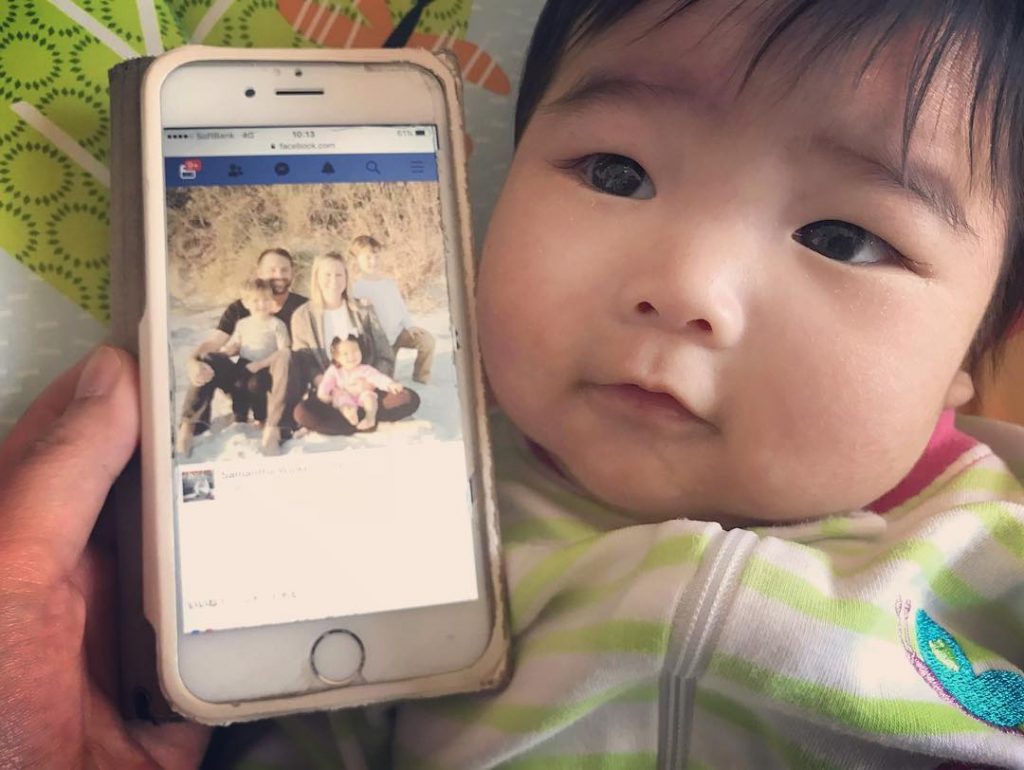
This is Sydney, next to a picture of the family waiting for her in America.
We must share this story to #BringSydneyHome since the State Department has now said the Tutterrows have to complete the adoption in Japan, changing up decades of precedent on how international adoptions have happened between Japan and the U.S.
We also need to talk about how nefarious force seeks to tighten control of international adoptions by American families, nearly eliminating the immigration of international orphans.
Here is the Tutterrows story to #BringSydneyHome
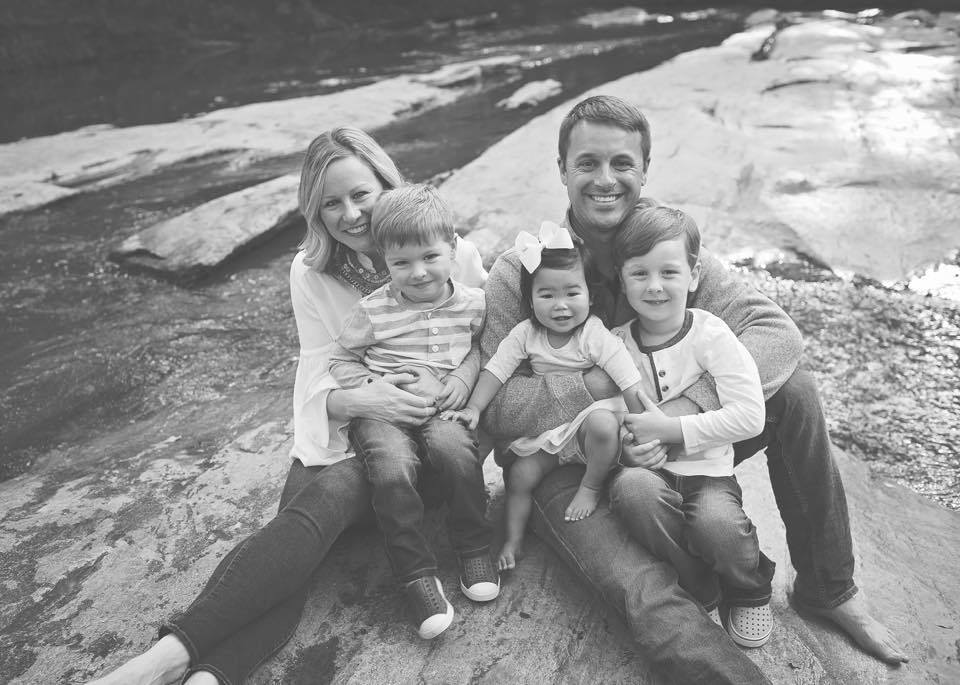
Samantha and Alex Tutterrow are your quintessential young Southern couple. They met in July 2001 at the University of Georgia through mutual friends. “We have been together ever since growing, maturing, and living our best life together,” Samantha said.
They married in 2006 and celebrated their 12th wedding anniversary on April 22. In addition to Annie and Sydney, the couple has two biological sons, Hunter (5) and Nathan (3).
In December 2015, Alex and Samantha decided to pursue adoption. “We educated ourselves on the process of domestic vs. international adoption we decided international was the best fit,” Samantha explained. “We originally chose China because the process is very clear compared to some other countries where there are lots of fluctuations with rules.”
During the process of compiling their dossier, the family heard through a friend about the Japan program with Faith International. The organization keeps 10 families “paperwork ready” to be matched with Japanese orphans. The Tutterrows knew they could quickly switch their immigration paperwork and be paperwork ready for Japan in a relatively short period of time.
“The Japan program took many of the benefits of both domestic and international adoption and combined them into one program,” Samantha said. About two months after the family was paperwork ready, they received a referral for their daughter, Annie. Two weeks later the family traveled to Japan to meet their new daughter and obtain an orphan visa to bring her back to the U.S. to finalize her adoption in their home state of Georgia.
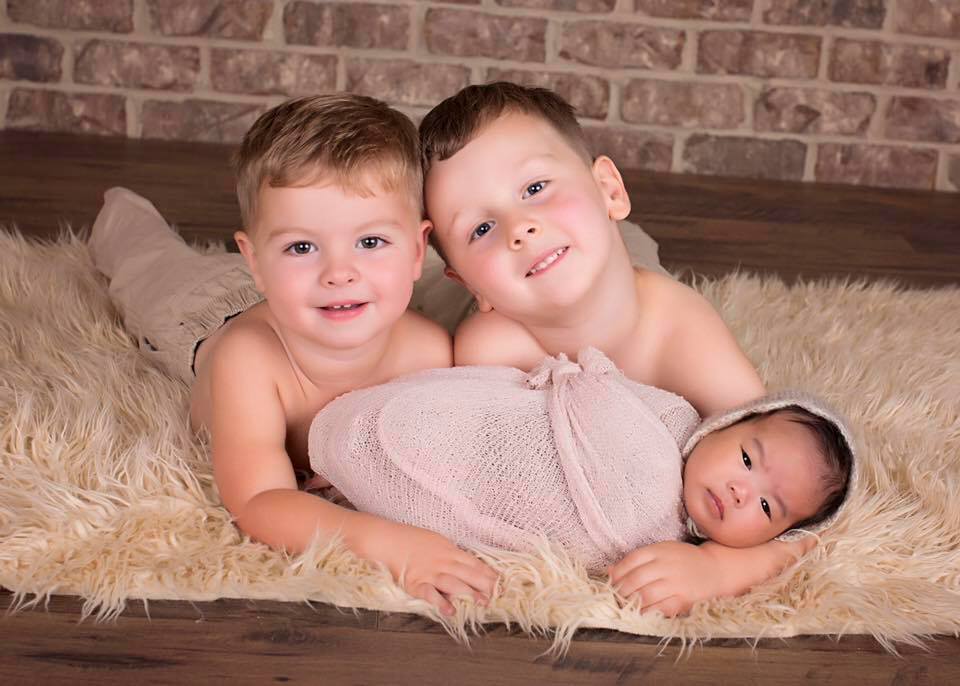
Baby Annie joined the Tutterrow family in 2016 and has had a happy home ever since.
There’s about 20 years of precedent for how adoptions have been handled between the U.S. and Japan. The Tutterrows followed these rules to a tee the first time around with Annie, and the second time with Sydney.
The State Department changed its policy at the last minute
Here’s a timeline of what’s happened over the past few months to see how the State Department decided to change the rules literally as the Tutterrows arrived at the U.S. embassy in Japan to get Sydney’s orphan visa.
As of June 14, Sydney is still stuck in Japan. The family has rented a temporary apartment and is traveling back and forth between the U.S. and Japan to be with Sydney while they complete the adoption in-country.
Editor’s note – the following are posts from Samantha’s personal Facebook account.
“In late September, we felt called to adopt another child. We had been blessed with the inclusion of our first daughter into our family and thus, chose to apply with Faith International’s Japan program again. We submitted our application in early October and began the process again, with the understanding that it would likely take a year or so to receive a referral. We completed the appropriate paperwork and another home study. Unbeknownst to us, Annie’s birth mother was pregnant with her second child during this time.
Dec. 21, 2017 – We are excited to announce that we are going to be adopting a GIRL! We look forward to welcoming Sydney Tutterrow into our family sometime in 2018! Our home study is complete and we mail our immigration paperwork off to the agency tomorrow. My heart is full this Christmas as we celebrate the birth of our Savior, the one who gives us the hope and faith we cling to daily as we walk through this journey of adoption again!
January 2018 – We were contacted by Faith International and informed that the birth mother of our first adopted daughter had just given birth. She had just made contact with their Japanese partner agency, Baby Life, to advise them of the birth and stated she wished to again pursue an adoption plan. While she knew the chances were unlikely, she asked if there were any possibility that this child could be adopted by us. We were grateful that we had already completed our home study and filed our immigration paperwork and happily agreed to move forward with this plan.
We received the formal referral documents and continued with the immigration process. All required forms were submitted and approved by USCIS and the National Visa Center, and we then waited for permission to travel from the US Embassy in Tokyo.
Jan. 22 – We received our fingerprint appointment time today from USCIS. This means we can now attempt to be seen as a walk-in. We ask for your prayers tomorrow as we try this to help expedite our case. They don’t have to see us or say yes. We pray for our story to be heard by a kind soul who will say yes!
Jan. 23 – not only did they accept us as walk-ins but we totally goofed and went without an appointment card for Alex. Since only mine came in the mail, I thought it was for both of us. The kind souls today worked with Alex and got it taken care of! One more step done! We are anticipating and praying to have approval within two weeks! Hoping to be on a plane to meet our baby girl around the time she is a month old if all continues to go smoothly.
Prior to the issuance of a visa interview, the US Embassy has the right to request an interview with the birth mother. This interview is conducted to ensure a child meets orphan status, to confirm the mother’s marital status and social history, and to ensure that the birth mother understands her legal rights. The US Embassy decided to conduct an interview with the birth mother prior to our travel clearance.
Feb. 12 – We finally heard back from the Tokyo US Embassy. They want our NVC number before they will even book the birth mom interview. Once immigration is approved they mail stuff to the National Visa Center who then processes it and creates a case and mails the info to the embassy that it affects. Once they get this info they will book her interview and then the week after our appointment. So if things run on schedule, we are looking at potentially having that number next week, her interview the following week and then our appointment the week after that. My heart is absolutely crushed and broken right now to know we are still a few weeks out for travel and that’s all with best case scenario timelines.
I know God loves her so much and that she is being well cared for and I have to find comfort in that. My prayer requests are that things move quicker, they consider waiving the birth moms interview once we get to that step (doesn’t sound likely though), and that we can just have peace during this waiting time and not allow our minds to be filled with all that unsettles us.
March 12 – We FINALLY heard from the US Embassy in Tokyo. They do want to interview the birth mom. She couldn’t do the date they gave so we are waiting to hear from them again to coordinate a new date. Praying it will be next week. Once that is confirmed we should have a better idea of our interview date which will ultimately dictate when we can travel. We are one step closer!
A major shout out to Kelsey, the assistant director and social worker extraordinaire at our agency. She has been so encouraging and supportive! She puts up with my venting and frustrations towards the inefficiencies of the government’s systems. She has gone over and beyond to help us in every way imaginable! We are so grateful for you! Without you, none of this would be possible!
March 22 – The birth mom completed her interview with the US Embassy last night! One step closer! We are now waiting for the US Embassy in Tokyo to schedule Sydney’s visa appointment. Once this is booked we can travel!
March 24 – That interview was completed on 3/22. We were then notified of our visa interview date of 4/2 and cleared to travel to Tokyo.”

An empty crib is waiting for Sydney in the Tutterrow home.
Editor’s note- It’s important to note here that the US Embassy would have never scheduled the visa appointment for Sydney if they thought she did not meet orphan status.
We’re going to pause to give you more background about what’s happening to independent adoption agencies while the Tutterrows were going through this process to adopt Sydney.
The State of International Adoptions
There’s been a quiet warfare waged against the international adoption community. International adoptions by Americans have plummeted by 81% since 2004, from 22,989 in 2004 to ~4,200 international adoptions budgeted in 2018 by IAAME, the international adoption accrediting entity.
During this time, a woman named Trish Maskew became the head of the State Department’s Adoption Division. Among the adoption community, she’s earned the nickname “the devil”.
From Federalist: “The State Department has created a climate of fear and mistrust. In every interview I conducted, a single name emerged as the primary source of this adversarial relationship: Trish Maskew, chief of the Adoption Division in the Office of Children’s Issues.
“Maskew was appointed in 2014, and the relationship between the State Department and the adoption community has deteriorated ever since. Where the State Department once reached out to the field—attending the annual Christian Alliance for Orphans’ Summit, for example—that collaboration soon ended. “She came in and we started immediately seeing a greater focus on punishment of agencies, and trying to get countries to tighten up their rules,” says Ron Stoddart.”(more here).
Regulations were proposed for a “country-specific accreditation,” or CSA, a required additional designation for every designated foreign country on top of already-existing accreditation. (more here)
In 2008, Maskew authored a paper titled “The Failure of Promise” which basically said the Hague Convention didn’t go far enough to protect orphans from corruption like child trafficking. In another paper Maskew co-authored, she challenged Harvard Law Professor Elizabeth Bartholet, one of the leading legal minds on international adoption. The second to last sentence of Maskew’s conclusion serves as an indicator to why this happened to the Tutterrows:
“We cannot responsibly conclude that a child must be adopted internationally before we know how the child got to the orphanage, where his or her parents are, and whether the cause of the family separation is permanent and cannot be remedied in a less radical manner than moving the child from its original family and culture to another.”
Now here’s where it starts to get ugly
The Council on Accreditation (COA) is a 40-year-old organization that provides accreditation for more than 2,000 agencies in a wide variety of social service fields, including adoption. It has been accrediting adoption agencies for 25 years, both before and after the United States ratified the international Hague Adoption Convention.
In the past, adoption agencies would reapply for their accreditation with COA but in August 2017, the Department of State announced the designation of Intercountry Adoption Accreditation and Maintenance Entity, Inc., (IAAME) as an accrediting entity. In February 2018, IAAME announced a new fee structure that would effectively bring down the majority of independent adoption agencies.
Editor’s note – the following comes from Kelsey Melvin, Assistant Director at Faith International, who worked with the Tutterrows on both Annie and Sydney’s adoptions.
“Every agency is in fear that there will be a target on their back.”
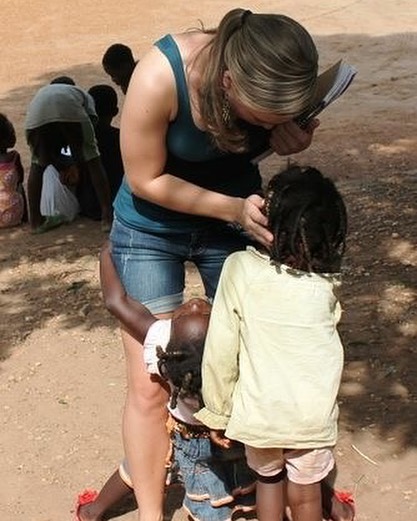
Kelsey’s work has taken her around the world helping to do God’s work by placing orphans with loving families. This photo comes from an orphanage in Africa, where 52 kids lived in a two-bedroom house.
These kids crossed a busy road to get their drinking water from a brown river. They could die from drinking from that water but surely would die had they not.
“On this same trip, a little boy held my hand and told me he wanted to go to heaven. He begged me to find him a family. I held dying children in my own arms and had to walk away, leaving them in an orphanage,” Kelsey said. “This happens all day, every day, in the same world we all share, yet our own government is contributing to the decline of adoptions. Things have got to change…Every child has the right to a permanent and loving family and they need our voice.”
“We are fighting an uphill battle against the Department of State. We are not the only agency, but we are one of the first, to truly experience the detriment DOS is bringing to children and families.”
“To share a (somewhat) condensed version – we began the process of Hague re-accreditation in May 2017, starting early, so we would easily be done before our expiration. COA was the accrediting entity when we began the process, and has been since the Hague was implemented in 2008. While in the midst of our re-accreditation, COA withdrew as the accrediting entity, as they disagreed with the actions and requests of DOS. At the time, they were the only accrediting agency.”
“All agencies whose Hague accreditation was expiring in 2018 (including us) were told that we were grandfathered in and that COA would conclude our re-accreditation process, as they would remain the accrediting entity through December 2018. We continued the re-accreditation process for many months.”
“While going through this process, a new accrediting entity was hand-picked by DOS: IAAME. Again, we were told that our re-accreditation would continue under COA, despite this change. COA was required to transfer all other agencies to the new accrediting entity by April 1, 2018.”
“During the re-accreditation process, our staff (including overseas) were interviewed for four days. All our files for the past five years were reviewed. COA interviewed past and present families and had the opportunity to review anything and everything they wished. Following the completion of a site visit, it is COA’s responsibility to advise all agencies of improvements that can be made. All requested information was provided by our agency to COA in an expedited manner.”
“It took months to hear back and for our documents to be reviewed, pushing us closer and closer to our expiration date on March 31, 2018. All the while, we were caught in the crossfires in the battle between State Department and COA.”
“The week before our expiration, COA asked for one additional report. We submitted it within one day to allow COA to review prior to our expiration. Rather than doing so, they informed us that they were incredibly busy with the transfer of agencies to the new accrediting entity and that they would be unable to review the documents we had submitted until April 19. This meant our accreditation would lapse. At that time, we were fine with this decision, as we anticipated receiving the new accreditation certificate around the 19th, and had very few families who would be impacted in the interim. We immediately informed our families and began to await the 19th.”
“One day prior to our expiration, we were notified that DOS had made a sudden change and that if COA did not issue our approval by the expiration of March 31 (rather than April 19th), we would essentially have to start the accreditation process over completely, under the new accrediting entity. This is after being in the process of re-accreditation for nearly 11 months!”
“COA informed us that this statement by DOS went against their memorandum of agreement and told us that they would address it with DOS. Their agreement with DOS remained in effect at that time, allowing them to continue the 2018 accreditations through December 2018.”
“The State Department gave no one the chance to refute their statement. On April 1, DOS sent out a notice for multiple agencies (including ours) stating that pending Hague renewals were refused! We received this notice at the same time it was made public – with no contact from DOS prior to issuing it.”
It was also during this time that the Tutterrows arrived in Japan to get Sydney
Editor’s note – so while Faith International is going through its reaccreditation battle, Alex and Samantha are already in Tokyo to adopt Sydney. The U.S. embassy in Japan then suspended all of Faith International’s cases except for the two families that already had scheduled visa interviews schedules, the Tutterrows and another American family.
It’s also important to note that the Tutterrows and the other family who were adopting a Japanese orphan transferred agencies immediately when they learned Faith International’s accreditation would lapse.
So just to catch everyone up here: the State Department is now getting involved with the actual accreditation process for independent adoption agencies.
We’ve seen what a mess the DOS has turned into, especially with the departure of Secretary of State Rex Tillerson and all the other hullabaloo from America’s current administration.
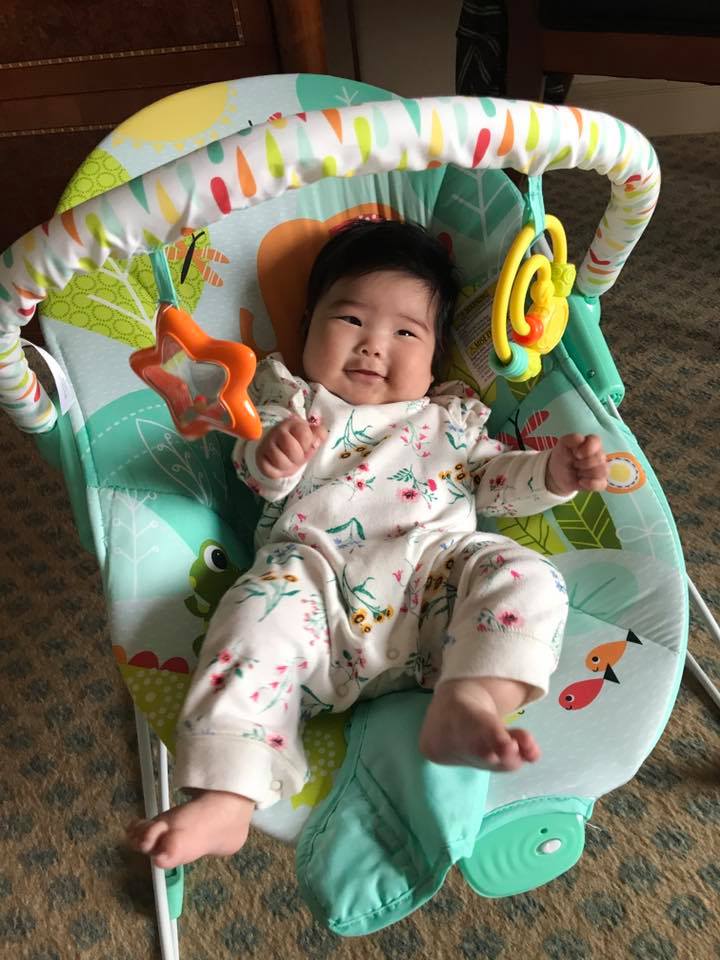
But for now, Sydney Tutterrow is being kept in Japan without her visa because the State Department denied Sydney’s orphan visa and told the Tutterows to complete the adoption in-country.
The most important thing here is the Tutterrows have done nothing wrong. There was also no ‘grace period’ for changing these laws.
There’s about 20 years of precedent for how adoptions have been handled between the U.S. and Japan. The Tutterrows followed these rules to a tee. At the finish line, the State Department decided to change the rules, and that’s inherently wrong. It’s illegal to change the rules at that late in the game, especially since the Tutterrows have already legally taken custody of Sydney.
“Nobody really seems to know what’s going on…This is bureaucracy at its finest and it’s disgusting. No one is thinking about the well being of our family, and the babies that are waiting for their homes.”
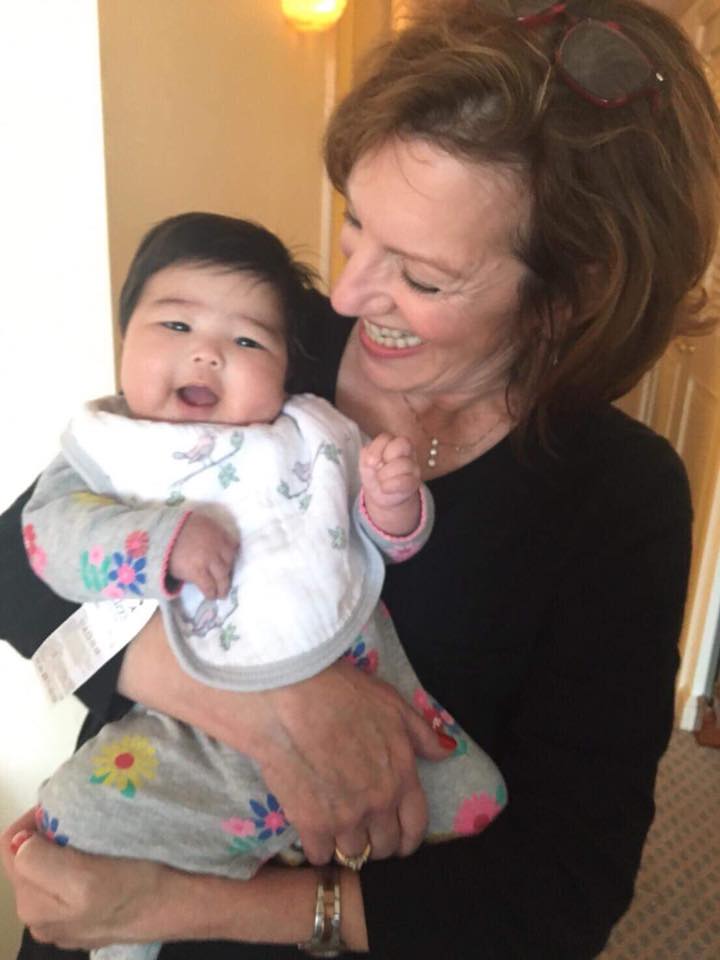
Now, the family has to shell out thousands of dollars a month to live in a temporary furnished apartment in Japan while they try to complete Sydney’s adoption through the Japanese courts.
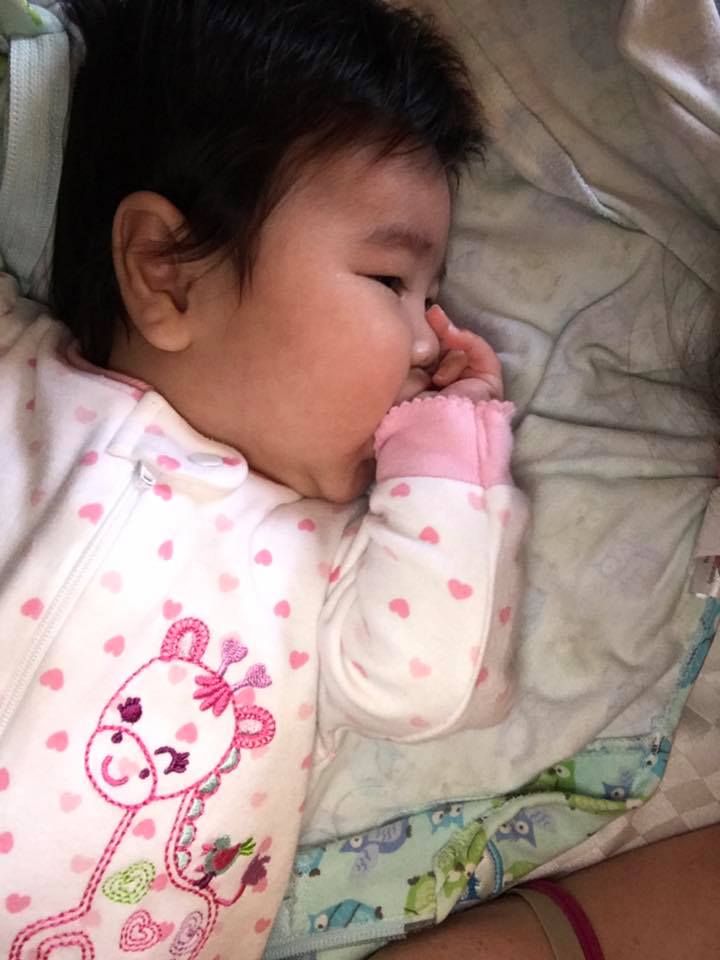
You can help support the Tutterrows by donating to their GoFundMe. Between the five roundtrip tickets to Japan, nearly a month of living in the Westin, and how having to rent an apartment, the expenses are “more than any of the cars I’ve ever bought,” Alex said.
Please call your representatives. Sydney needs to come home now. Don’t take American citizens and hold them hostage in a country, Japan of all places, where there are decades of precedent.
“At this point, we feel like our family is being held hostage by our own government while they review a program that has been operating without incident for 20-plus years. We are begging for your help to get her home.”

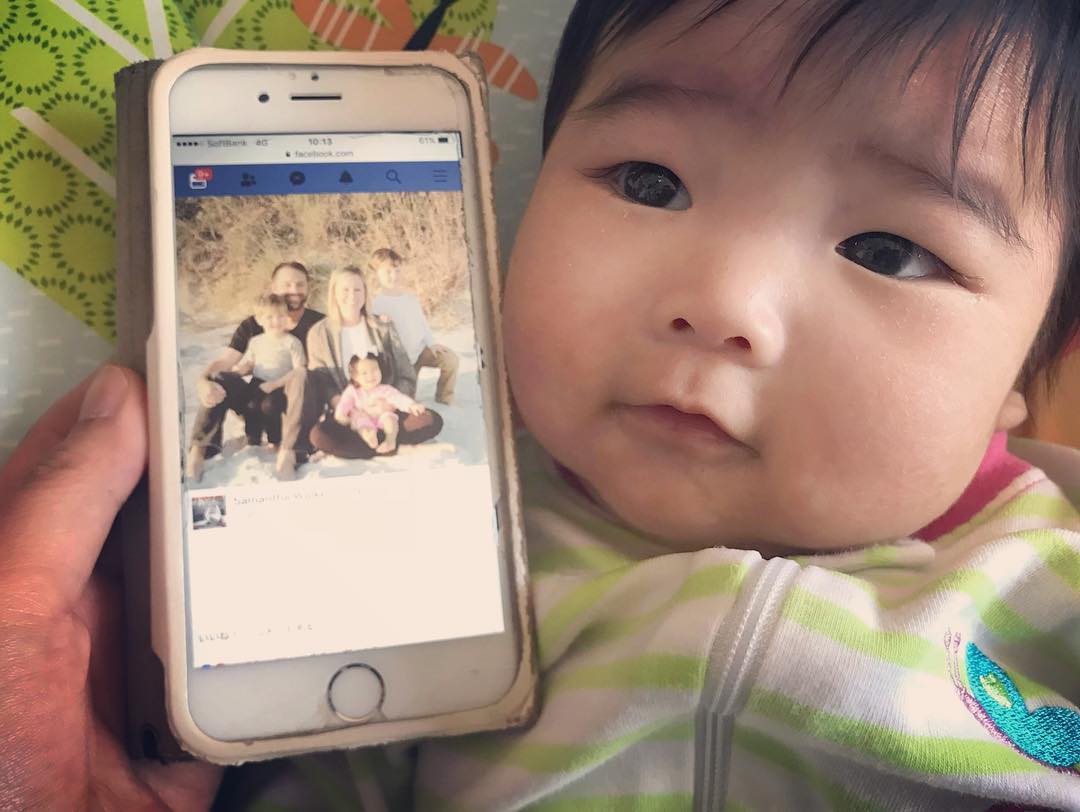
We adopted from Japan in 2012. As soon as we got custody of our son and were face to face with Babylife representatives, red flags went up for us right away.
The paperwork was obviously put in place to placate US and Canadian immigration officials, as we later found out how little legal accountability private adoption agencies have in Japan under the Special Adoption law. Don’t even get me started on the lack of proper credentials involved. We warned the US and Canadian agencies that work with BL, about future problems and possibly future scandals. I’m sorry to say that other things were more important to these agencies, than ensuring that every thing about these children’s adoptions were ethical.
An excellent book to read is Peter Hayes’ and Toshie Habu’s book on Japanese adoptions. There have also been excellent articles on this subject matter in Japanese newspapers, especially during and after BL’s investigation for various legal infractions a few years ago.
I for one want my son to know the truth about his adoption, and I welcome the Japanese government making new laws to protect the birth parents and the adoptees. I also welcome the US and Canadian governments investigating the Japanese adoption process, and making sure that it’s not a free for all to the advantage of private adoption agencies.
Hi Emily – you made a ton of assumptions in your comments but here’s the most important one that we need to clarify: “to make sure that children offered for adoption meet the adoption laws of the US.” The U.S. Embassy would have NEVER scheduled the orphan visa interview for Sydney in the first place if she didn’t meet the laws of adoption. But the Embassy did schedule the interview, then denied the visa!
There’s a ton of other baseless comments and assumptions you wrote that I’m not going to bother to address because some of those remarks you made are just plain hurtful. You can go stick it where the sun don’t shine.
PS This was the problem in Cambodia and Vietnam too – parent has the child, visa investigation doesn’t go as smoothly as planned for whatever reason. The USA can’t, if I recall correctly, do their investigation for a visa on a child where the foreign government hasn’t “done their thing” to approve the adoption. Once the child has makes it through the foreign government process and then given to the USA family, then and only then can the USA investigate. There had been talk about working out being able to do investigations prior to this step but I am not sure what happened to that “test” program. Doing this would involve the permission of the foreign government. As a result this family is not the first, and will not be the last, where the state department’s estimate of when they will be done won’t be/wasn’t accurate.
The better part of prudence, if one can’t stay in a foreign country as long as it may take is not to travel until the investigation is actually complete. It doesn’t sound like it was in this case since one of the delays was the birth mom couldn’t make the appointment given. Then the process is pretty painless and problem free. Travel before then and there is risk. Likely there had been few to no problems with previous children referred by this agency, they weren’t anticipating problems and then unexpectedly delays happened (like, for example the one mentioned that the birth mom couldn’t come for the interview when scheduled), or unexpected problems were found… That is not the fault of the state department. It doesn’t sound like they are purposely throwing roadblocks in the way of this family. It just sounds like an unfortunate set of circumstances. And of course adoption visas and the associated investigations aren’t the only thing that those people do. They can’t drop everything when the time line changes.
Again I understand the pain of delays, lost referrals, etc. Been there done that have the t-shirt. It also sounds like to me their agency did not do a good job explaining to this family the risks, what could go wrong – either that or the family didn’t listen because their first adoption went smoothly… This sound really minor compared to what families adopting from Cambodia went through in 2001-2 (when there was the slowdown and then the shutdown). (see https://www.brandeis.edu/investigate/adoption/cambodia.html for more information. Also Trish used one of the orphanages mentioned in the article – Asian Orphans’ Association owned and operated by Serey Puth also mentioned in the article). And while what is going on with this family’s adoption likely has little in common with the widespread corruption that was in Cambodia, the underlying laws are the same with respect to investigations, when it can happen in the process, etc.
What is ironic is that years ago Trish worked with, I believe it was, Children’s House International, and assisted in the adoption of children from Vietnam (which was shut for corruption) and then Cambodia (which was shut for corruption), using an orphanage director that she knew was unethical and bought children as she was warned about that several times. In addition she and the agency accepted more families after the slowdown started due to the suspected corruption prior to the shutdown whereas there were some other agencies that did not do that. So much for ethics back then I guess. Somewhat ironic that she only decided to work on the other side of the fence after she couldn’t earn any more money through working in international adoption assisting with adoptions in a corrupt country even after she knew this was the case.
That being said having a thorough investigation is the right thing to do. It is in everyone’s best interests to make sure that children offered for adoption meet the adoption laws of the USA, that everything is done ethically and above board. This can take time to be sure the birth mom wasn’t pressured, paid, etc. to “abandon” her child for adoption. And that other birth family members, the birth father, etc. don’t want to raise this child. This can take time. That they don’t get someone else’s baby as fast as they want is a selfish viewpoint. This is NOT “their”child until the adoption has been completed. While they have every right to be unhappy that things aren’t moving as fast as they want, they should be thankful that the state department is being careful. If they could stop, just for one minute, and put themselves in the shoes of the birth family. If, in fact, the birth mother was pressured to give her child up for adoption, the life long pain that could cause her is tremendous and that mother should be given a chance to make her decision without being pressured. As it is that woman and her family will grieve even if it turns out this baby was voluntarily given up for adoption. If that baby was not given up voluntarily then it seems to me what is going on is child trafficking.
I understand their agony with the wait (I too have adopted and lost several referrals before I was able to finally adopt), but it is in the best interests of the child and her (birth) mom and her mother’s extended family that things are done ethically, legally, above board and carefully.
If this child is not eligible under USA adoption laws there are other children out there who need families who legitimately meet the USA adoption laws/rules/regulations. They will eventually have another baby girl referral, it just might not be this baby girl. They will go on to love another child. If they don’t think they can love any other child than this one then, in my opinion, maybe they shouldn’t be adopting.